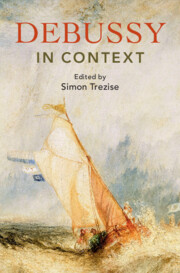Book contents
- Debussy in Context
- Composers in Context
- Debussy in Context
- Copyright page
- Dedication
- Contents
- Illustrations
- Contributors
- Preface
- Notes on the Text
- Abbreviations
- Part I Paris: City, Politics, and Society
- Part II The Arts
- Part III People and Milieu
- Chapter 12 Debussy and the Family in Third-Republic France
- Chapter 13 Romantic Relationships
- Chapter 14 Relationships with Poets and Other Literary Figures
- Chapter 15 Publishers
- Chapter 16 Composers with Whom Debussy Was Associated
- Chapter 17 Music Education and the Prix de Rome
- Part IV Musical Life: Infrastructure and Earning a Living
- Part V The Music of Debussy’s Time
- Part VI Performers, Reception, and Posterity
- Recommendations for Further Reading and Research
- Index
Chapter 15 - Publishers
from Part III - People and Milieu
Published online by Cambridge University Press: 23 May 2024
- Debussy in Context
- Composers in Context
- Debussy in Context
- Copyright page
- Dedication
- Contents
- Illustrations
- Contributors
- Preface
- Notes on the Text
- Abbreviations
- Part I Paris: City, Politics, and Society
- Part II The Arts
- Part III People and Milieu
- Chapter 12 Debussy and the Family in Third-Republic France
- Chapter 13 Romantic Relationships
- Chapter 14 Relationships with Poets and Other Literary Figures
- Chapter 15 Publishers
- Chapter 16 Composers with Whom Debussy Was Associated
- Chapter 17 Music Education and the Prix de Rome
- Part IV Musical Life: Infrastructure and Earning a Living
- Part V The Music of Debussy’s Time
- Part VI Performers, Reception, and Posterity
- Recommendations for Further Reading and Research
- Index
Summary
Although losing more and more ground to German firms in the 1880s, the large French music publishing houses, such as Hartmann, Heugel, Choudens, and Durand, played a predominant role in French musical life by distributing all kinds of music, from the most popular to the most learned, as well as numerous adaptations and transcriptions, for example when an opera or a work was a huge success. Apart from those publishing houses that dominated the French market, the Parisian market was teeming with small publishers. Before being supported by Georges Hartmann in 1894, the young Debussy tried to have his works published by all sorts of publishers, from the most prestigious, such as Durand or Choudens, to the least known, such as Paul Dupont. Jacques Durand was a both a friend and business associate during the latter part of Debussy’s life, for he took over the publishing of Debussy’s music and helped him out in many ways. Their extensive correspondence is consequently revealing.
- Type
- Chapter
- Information
- Debussy in Context , pp. 143 - 149Publisher: Cambridge University PressPrint publication year: 2024

